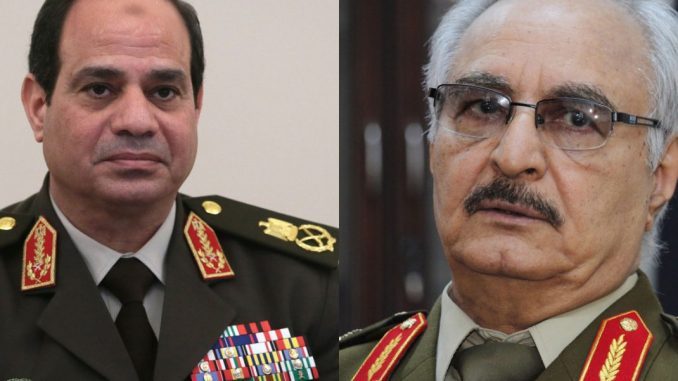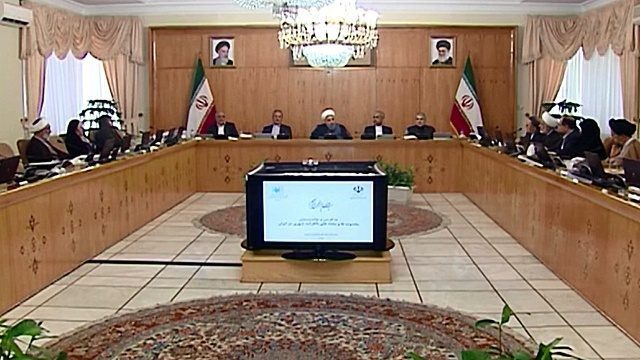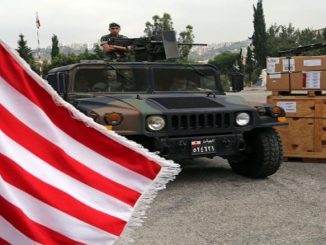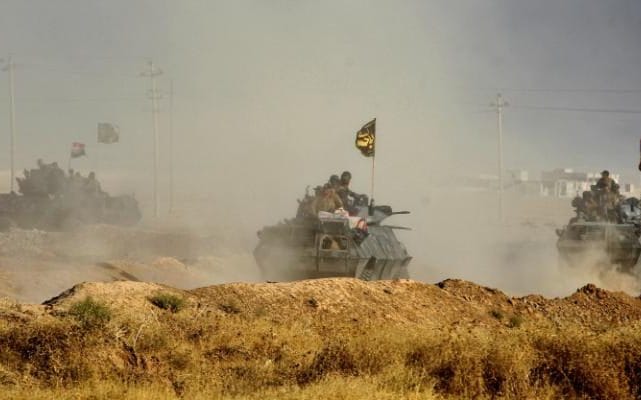
The UAE has sent F-18 warplanes to enhance its military presence at the Mohamed Naguib Military Base, north-west of Egypt, a military source said.
The source, who spoke on condition of anonymity, told the New Al-Khaleej that the reinforcements were sent in agreement between Egyptian Abdel Fattah Al-Sisi and Abu Dhabi Crown Prince Mohammed Bin Zayed following their talks in the UAE capital last week.
The source said the UAE reinforcements aim to support the forces of the head of the Libyan National Army, General Khalifa Haftar, whose are fighting terrorist groups on the ground.
In July, Bin Zayed, Haftar and Al-Sisi attended the opening ceremony of the military base. The Egyptian Army provides training and logistical support for Haftar’s forces in eastern Libya and has previously carried out airstrikes against his opponents in Derna and Benghazi.
In the same context, Aqilah Saleh, the speaker of the Tobruk-based House of Representatives (HoR), told Cairo-based Youm7 newspaper that Khalifa Haftar-led self-styled army is going to launch an attack on Derna in coordination with Egyptian military forces.
“A military operation in Derna is very significant for Egypt in order to block the route for terrorists disallowing them from escaping from Derna to Egyptian soil,” Saleh explained.
He also mentioned that Egyptian companies will be helping in rebuilding war-torn areas in Libya, hailing Egypt’s role in Libya.
Media reports unveiled that General Khalifa Haftar, the commander the Libyan National Army(LNA), has been on a visit to Egypt over the last couple of days as part of as what has been referred to as “joint coordination between Egypt and the army leadership in the fight against terrorism”.
Haftar is a military figure, backed by Tobruk government based in eastern Libya that refuses to recognize the U.N.-backed government, enjoys the support of several Arab nations, including Egypt, the United Arab Emirates, and Jordan, as well as western countries as France.
According to an official, who spoke on condition of anonymity, Haftar arrived in Cairo late on Wednesday and held a series of meetings with senior Egyptian officials to discuss the political and military developments in Libya, pointing out that the talks touched on the issue of coordination in the fight against terrorist groups.
“There is coordination at the highest level between the Libyan National Army and the Egyptian authorities in this regard,” he said.
In the meantime, an official source said that “the National Army is in the process of large-scale military operation in the next few days to begin the liberation of the city of Derna,” which is the main stronghold of terrorist groups in eastern Libya, and added that “preparations [for the operation] are nearing completion.”
Haftar’s eastern-based LNA, one of a number of militias that have struggled for power in Libya since a 2011 uprising ended Muammar Gaddafi’s four-decade rule, is waging a military campaign against a coalition of militants and ex-rebels known as the Derna Mujaheddin Shura Council (DMSC) that controls Derna
In fact, the attention has shifted to the coastal city after Haftar announced victory in a three-year military campaign against a similar coalition in Benghazi, 350 kilometers to the west, in July last year.
In May 2017, the city was also a target of Egyptian air strikes. At that time, Al-Sisi claimed that it was responding to an attack against Coptic Christians on its territory, though that attack was claimed by Daesh. Egypt claimed bombed the locations of Derna Shura Council, and bombed also Houn as well.
Accordingly, media outlets reported that Houn was the epicenter for the inexplicable air-attacks, as it received air raids on locations like Al-Mujahid Brigade and Tagreft Brigade, which are part of Al-Bunyan Al-Marsoos operation that rooted out ISIS from Sirte.
Analysts said that it is beyond certain that the Egyptian airstrikes were meant to pave the way for Khalifa Haftar’s forces to gain more ground in Libya after they had failed to do it themselves in Derna or in Jufra.
Many believe that Libya’s strong commander is seeking power in Libya and that” fighting terrorism” is only a card that he uses to justify his war against Derna and other cities.



